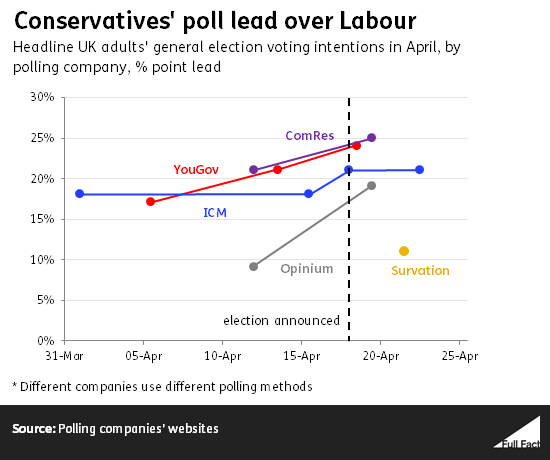“Tory lead is slashed in half after tax U-turn: Bombshell Mail on Sunday poll shows May plummeting by 11 points ...denting hopes of a landslide”
Mail on Sunday, 24 April 2017
The Mail’s front page from yesterday isn’t comparing like with like. There’s little evidence that the Conservatives’ poll lead has plummeted by this much, and no strong indication yet that the recent tax policy announcements from the Conservatives have had any effect on public opinion.
Honesty in public debate matters
You can help us take action – and get our regular free email
Comparing Survation with ICM
The paper quotes a recent opinion poll conducted by market researchers Survation at the end of last week, which put the Conservatives on 40% and Labour on 29% - an 11 point lead. The headline gets this slightly muddled, describing it as Theresa May plummeting by 11 points.
It then compares it to another poll from Tuesday last week, from researchers at ICM. It put the Conservatives on 46% compared to Labour’s 25% - a 21 point lead.
That’s a big difference over four days, but not one we can draw a trend from. ICM has already released another poll conducted over the weekend, showing a 21 point lead for the Conservatives.
Opinion polling isn’t an exact science, and companies use different methods to measure public opinion. ICM and Survation have different approaches in how they adjust their findings to account for people’s likelihood to vote, deal with ‘don’t know’ responses and make their findings representative of the UK population.
For that reason, polling expert Anthony Wells of YouGov advises caution in comparing two specific polls:
“One should only compare polls from the same company conducted using the same methodology – otherwise it’s just as likely that any difference is down to different methodological approaches”.
In other words, there’s no way to know if the different polls’ findings represent a genuine change in public opinion, or just an effect of different polling practices.
Even if two companies used exactly the same methods, polls are only ever estimates of public opinion and always have a margin of error.
The forest, not the trees
Even though pollsters use different methods, it still helps to look at what multiple polls are saying – and how closely they agree – to get a general picture of what the public thinks.
If you’re interested in whether a series of announcements in the past week on foreign aid spending, protection for pensioners and tax rises have affected the Conservatives' poll ratings, you’ll have to wait a little longer for a robust indication of it.
Most polls from different companies since the start of April generally agree the Conservatives are ahead by roughly 19 or 20 percentage points. But there’s still some variation: Opinium recently put the lead at nine percentage points, ComRes has it at 25. Again, all these polls will have a margin of error.

We can expect to see more polls this week asking people’s views following the policy announcements, so we might see some indication then if the gap between the parties is narrowing. Even then, it would be difficult to pin down the cause.
Can the polls be trusted?
It’s hard to say yet. The polls at the last general election underestimated the Conservatives’ lead, and companies have been adapting their methods since then. “The election will be a chance to see whether these changes have been enough to stop the historical overestimation of Labour support, or indeed whether they’ve gone too far and resulted in a pro-Tory skew”, says Anthony Wells.
